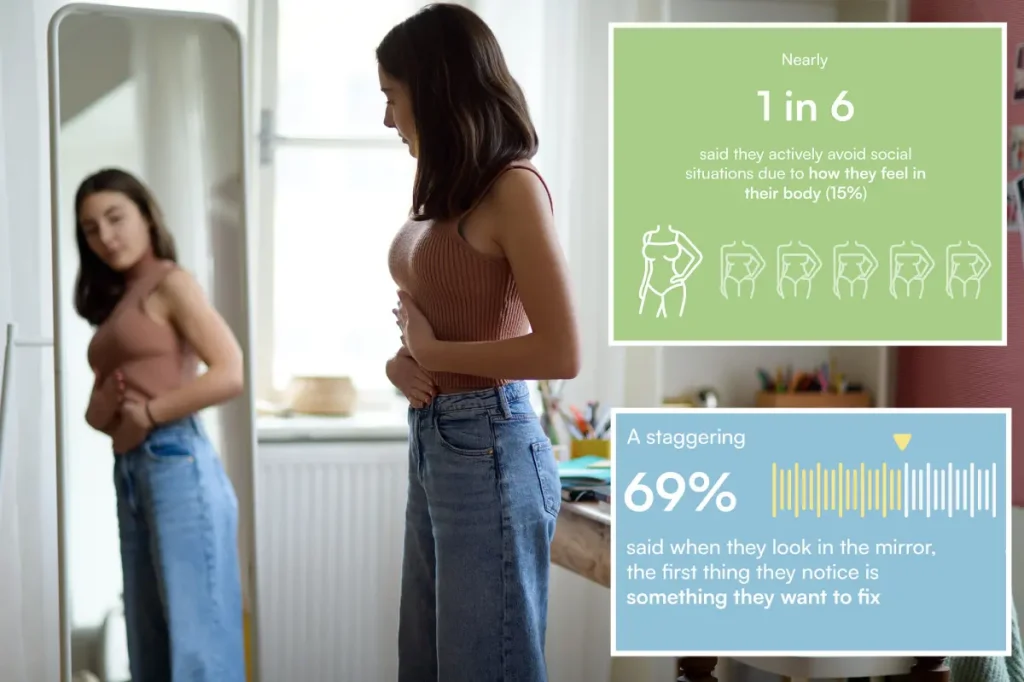The Mirror Effect: How Body Image Shapes American Lives
In homes across America, millions of people are caught in a silent struggle with their reflection. A recent survey by Talker Research for Eden Health reveals that the average American experiences negative thoughts about their body four times daily—a statistic that might seem small until you consider its cumulative impact. Imagine criticizing yourself four times every day for years. This isn’t just occasional self-doubt; it’s a persistent undercurrent reshaping how people move through the world. The survey found that 69% of Americans report that when they look in the mirror, their first instinct is to find something to fix rather than something to appreciate. Perhaps most telling is that respondents feel completely uncomfortable in their own skin half of the time—a sobering reminder that for many, simply existing in their body has become a source of constant tension.
This discomfort doesn’t stay contained within private moments of mirror-gazing. It spills into everyday decisions and social interactions, fundamentally altering how people engage with their lives. Nearly one in six Americans (15%) admitted to actively avoiding social situations because of how they feel about their bodies. More than half (63%) believe they would finally be able to enjoy clothes if they felt better physically. When half of respondents say they would feel more confident in photos or social settings if they could feel good in their own skin, we’re witnessing something profound: countless meaningful life experiences being diminished or avoided altogether because of negative body image. These aren’t just statistics—they represent birthday celebrations attended with anxiety, beach days spent covered up, and family photos declined because the thought of seeing oneself in an image becomes too painful.
Weight insecurity stands as the most common source of bodily dissatisfaction, with 38% of respondents naming overall weight as their primary self-consciousness. But behind these numbers lies a cycle of hope and disappointment that many Americans know intimately. The survey revealed that 60% of respondents have lost weight in the past only to regain it—a frustrating experience that leaves emotional scars. Another 13% reported trying to lose weight without any success at all. These experiences generate profound emotions, with 56% reporting frustration and 47% experiencing discouragement associated with their weight loss attempts. This emotional toll creates its own barrier to health, as nearly one-third (31%) cited previous failures as what’s currently holding them back from trying again. It’s a heartbreaking cycle: past disappointments creating hesitation, which prevents new attempts at change, which reinforces the belief that improvement isn’t possible.
The roadblocks to sustainable health change extend beyond emotional barriers. Americans cited affordability (26%), confusion about effective approaches (21%), and lack of time or energy (20%) as major obstacles preventing them from addressing their health concerns. Perhaps most telling is that nearly a quarter (23%) simply don’t know where to begin—a stark indication of how overwhelming and opaque the health landscape has become for ordinary people. These barriers create a perfect storm that keeps many trapped in patterns they desperately want to change. The traditional healthcare system has often failed to provide accessible, practical support for weight management and body image issues, treating them as purely personal challenges rather than health concerns deserving of professional guidance. This gap has left many Americans feeling abandoned to navigate complex health journeys with inadequate tools and support.
Despite these challenges, the survey reveals a population that hasn’t given up hope. Instead, Americans are reimagining what effective health support might look like. Fifty-six percent expressed desire for programs that adapt to their changing needs rather than rigid, one-size-fits-all solutions that don’t reflect the complexities of real life. Nearly a quarter highlighted 24/7 access to licensed providers as a feature that would help them maintain consistency—acknowledging that health decisions don’t just happen during business hours. There’s also growing interest in medical approaches to weight management as part of a comprehensive plan, with 52% prioritizing sustainable weight maintenance over rapid results. This signals an important shift in thinking: Americans increasingly recognize that quick fixes aren’t the answer to long-term health challenges.
This evolving perspective on health has created space for new approaches like those offered by Eden Health and similar platforms that integrate digital and physical care with personalized support. Eden Health co-founder Joshua Khan speaks from personal experience about the limitations of traditional weight loss approaches: “You lose weight, but you’re never given the tools to keep it off, and there’s no infrastructure in place to support long-term change.” CEO Adam McBride echoes this sentiment, noting that their mission grew from “watching people blame themselves for systems that never really worked.” Their approach represents a broader shift toward what they call “Health 3.0″—comprehensive systems addressing multiple issues at the root level rather than treating symptoms in isolation. As Americans continue grappling with body image and its far-reaching effects on their lives, this evolution toward more holistic, supportive care models offers hope that the next generation might have a healthier relationship with their bodies—and by extension, with their lives.














